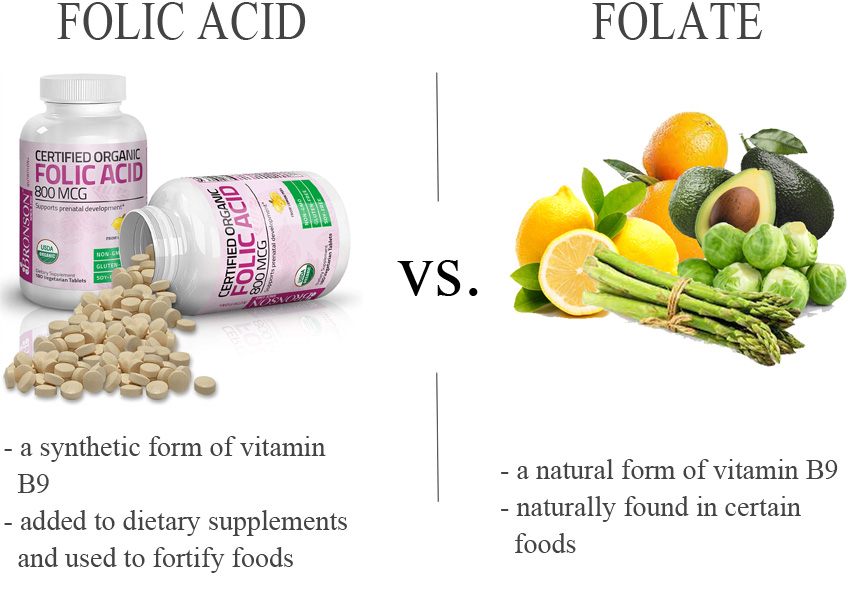Folate and folic acid are some of the best-known prenatal vitamins. But what is their difference, and which one is better in pregnancy?

What’s the difference between folate and folic acid?
Both folate and folic acid are vitamin B9 and are, as a final substance, basically the same. Once absorbed by the body, folate and folic acid function in the same way!
Folate vs. Folic Acid
The term folate includes various chemically related substances with the same activity, including folate present in food and synthetically produced folic acid.
Difference in folate and folic acid
1. The difference between folate and folic acid is in their origin!
Folate is a natural vitamin B9, which is present naturally in certain foods. Folic acid is its synthetic form, found in dietary supplements and fortified foods.

2. Absorption in the body:
The natural folate found in foods is typically not as well absorbed as its synthetic form. Some estimate that while the body absorbs all folic acid added to the food, it absorbs only 50% of naturally present folate in foods. (Folic Acid and the American Food Supply)
Yes, pregnant women should include more foods rich in folate into their everyday diet, rather than taking folic acid prenatal supplements. But it can be hard to reach the recommended levels. Furthermore, it seems that the body does not absorb all the naturally present folate either.
Consequently is folic acid one of the most frequently used prenatal supplements.
3. Folate and Folic Acid RDA = Recommended Dietary Allowance
One of the differences between folate and folic acid is the maximum intake per day, which is still considered safe.
As said, folate and folic acid are forms of vitamin B9. Vitamin B is water-soluble, meaning folate’s excess doesn’t accumulate in the body but excretes by peeing, requiring its adequate ingestion each day.
The recommended daily amount of folate and folic acid is the same! But … While you can consume more folate than recommended without consequences, could too much synthetic folic acid cause a few side effects.
Chronically increased folic acid intake may cause allergies, potentially mask symptoms of a vitamin B12 deficiency, and increase the risk of diabetes.
Recommended daily intake
The recommended daily amount of folate for adults is 400 micrograms. That is easy to achieve with a diverse, balanced diet. Just as an example: you get that amount of folate into your body if you eat four boiled asparagus (240 g) or two boiled buds of Brussels sprouts (84 g) during the day.
Women who are pregnant or could become pregnant should get 400 to 1000 micrograms of folate and folic acid a day. They are recommended to get 400 micrograms per day of folic acid from dietary supplements in addition to the folate present in a varied diet.
The maximum amount of folate and folic acid per day:
The safe intake of folate, which is naturally present in foods, cannot be exceeded! But the upper limit of synthetic folate (folic acid) is 1000 micrograms per day!
Why is folate important?
Folate is involved in many biological functions in the body, including amino acid synthesis, cell division, blood formation, and DNA synthesis. Our body needs it for normal psychical functioning and a healthy immune system. Enough folate also reduces fatigue and exhaustion!
Folate requirements increase during the pregnancy, by long-term use of certain medications, and with alcohol abuse.
Because of its importance for humans health, the Food and Drug Administration (FDA) requires manufacturers to add folic acid to enrich certain foods.
Foods fortified with folic acid include bread, flours, pasta, rice, and certain fortified breakfast cereals. Since FDA introduced this, the number of babies born with spina bifida has significantly decreased.
Folate and folic acid in pregnancy
Sufficient folate intake during pregnancy contributes to normal fetal development.

Higher intake significantly reduces the risk of neural tube defects, such as spina bifida and anencephaly. Anencephaly happens when the neural tube fails to close at the head end, spina bifida is a defect that occurs lower along the spinal cord.
Consequently, an increased amount of folate is advised not just during the pregnancy but at least four months before pregnancy and during breastfeeding too. Women in these groups should consume more folic acid, either from fortified foods, dietary supplements, or a combination of both.
Benefits of folate supplements for the baby

Folic acid supplements reduce the risk of some birth defects
Taking folic acid supplements before and during pregnancy helps in preventing neural tube defects in the fetus. A higher dosage of folic acid may also reduce the risks of preterm birth, baby’s heart irregularities, and cleft palate.
Folic acid supplements may reduce the chance for autism
Some research suggests that taking folic acid before and during early pregnancy could reduce the chance of developing autism. However, more research will be needed to determine the potential role of folic acid.
Preventing miscarriage
Consuming enough folic acid during pregnancy protects against miscarriage.
Benefits of taking folic acid supplements for the adults
Lower risk of depression
People with folate deficiency may be more prone to experience depression. Lower folate levels are also linked to a poorer response to antidepressant treatment.
If you already taking depression medications, talk to your doctors first. Folic acid supplements could make depression medications more effective.
Healthy heart
Folic acid lowers levels of homocysteine in the blood. Elevated levels of homocysteine in the blood increase the risk of heart attack and stroke.
By reducing its levels, folate may reduce the risk of cardiovascular disease.
Rheumatoid arthritis
Some doctors add folic acid to people with rheumatoid arthritis, suggesting it reduces arthritis medication’s side effects by around 79%.
Take away
Folate and folic acid are a form of vitamin B9. Folate is a natural substance, and folic acid is its synthetic form. Both are important in pregnancy and significantly reduces the chances of developing spina bifida.
It doesn’t matter if you eat a folic acid supplement or a folate-rich food you are doing the right thing! Of course, it is always better to opt for a natural way, especially in pregnancy! But folic acid is one of the most widely used and researched prenatal supplements.
